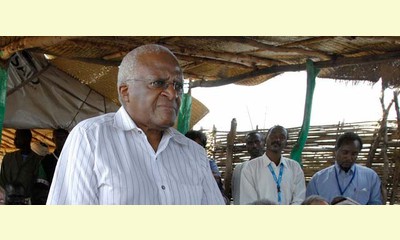|
|
The Elders visit South Sudan in sombre mood and urge continued dialogue with Khartoum
un articulo por The Elders
Archbishop Desmond Tutu and his fellow Elders Martti Ahtisaari, former President of Finland, and Mary Robinson, former President of Ireland, met President Salva Kiir in Juba today to discuss the challenges faced by South Sudan as the people prepare to celebrate their first year of independence.

Bishop Tutu of The Elders
click on photo to enlarge
At this crucial moment for the world’s newest country, the Elders are deeply concerned about the unresolved issues between Sudan and South Sudan, as well as the humanitarian crisis resulting from the ongoing hostilities in Blue Nile and South Kordofan in Sudan.
The Elders raised a wide range of issues with President Kiir, placing special emphasis on the importance of resolving disagreements and conflict through dialogue, and building a viable state in South Sudan.
Archbishop Desmond Tutu, Chair of The Elders, said:
“A year ago we joined the rest of the world in celebrating the birth of the new nation of South Sudan. Today in Juba, my mood is rather more sombre. The economy is in dire straits due in part to the government’s decision to shut down oil production. The President’s own estimation of losses due to corruption is truly shocking. And the relationship with Khartoum is acrimonious and mistrustful.
“There is still time to turn things around. Important talks between Sudan and South Sudan are getting underway in Addis Ababa again, under the aegis of the AUHIP chaired by President Thabo Mbeki. We as Elders will do our utmost to persuade the leaders in both Juba and Khartoum to accept that they will always be neighbours and will always be interdependent. Dialogue is the only way to resolve their differences and to build two viable states; military force is a dead-end, promising nothing but suffering and misery to their people.”
The Elders arrived in Juba today from Addis Ababa, where the African Union-chaired talks between Sudan and South Sudan have just resumed. They met former South African President Thabo Mbeki, Chairperson of the African Union’s High-level Implementation Panel (AUHIP) and former President of Burundi Pierre Buyoya, and commended the Panel’s efforts to bring the parties back to the negotiating table.
The Elders urge Sudan and South Sudan to make decisive progress during this new round of talks, as a deadline for an agreement of 2 August set by the UN Security Council approaches.
(This article is continued in the discussionboard)
|








|
DISCUSSION
No hay pregunta ligada a este article.
* * * * *
Comentario más reciente:
(The following is continued from the main article listed above.)
Martti Ahtisaari, former President of Finland, said:
“The differences between Juba and Khartoum are based on mistrust, which needs to be overcome by confidence-building measures. I hope both parties will make the most of these talks and reach agreement before the 2 August deadline. As Elders, we strongly encourage President Kiir and President al-Bashir to meet in person as soon as possible. The first responsibility of any government is for the welfare of its people – and that cannot be delivered in Sudan or South Sudan unless their leaders work together as partners, not enemies.
“Here in Juba, ahead of the first anniversary of independence, I want to emphasise this country’s enormous potential. Its situation would be transformed by peace. Sustained dialogue with Sudan – and sound, inclusive government within – is the only way for South Sudan’s citizens to reap the benefits of their hard-earned sovereignty.”
Mary Robinson, former President of Ireland and former UN High Commissioner for Human Rights, said:
“We are particularly concerned about the human impact of tensions between the North and South. The conflicts in South Kordofan and Blue Nile have pushed 200,000 refugees to neighbouring Ethiopia and South Sudan. Another 500,000 people of South Sudanese origin living in Sudan are in a state of legal limbo after having lost their Sudanese citizenship. . ... continuación.

|
|









